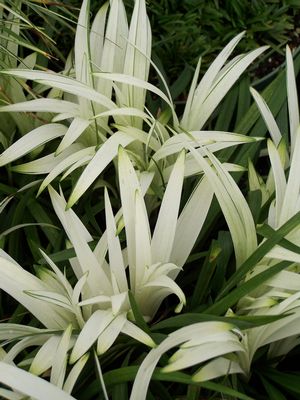View All Plants :: View All GRASSES & GRASS-LIKE PLANTS :: View All SUN PERENNIALS
Liriope muscari 'Okina'
Frosted Monkey Grass
Plant Type:
GRASSES & GRASS-LIKE PLANTSLiriope muscari ‘Okina’ – 'Okina' is Frosted Monkey Grass. The grassy blades emerge white with a touch green at the bases and sometimes at the tips of the leaves – astonishing, surprising and so very unusual. Gradually the white foliage becomes greener with an increasing number of irregular pinstripes. Finally all blades turn completely green by mid to late season. Later in the season the clumps are topped with lilac flowers. When used as a groundcover ‘Okina’ is a show-stopper. Plant it in full sun with sweeps of Black Mondo Grass for an unforgettable combination! Spring planting is strongly advised in the north. Moderately spreading, colonizing. We strongly recommend that you read the complete Genus Overview below.
Characteristics and Attributes for Liriope muscari 'Okina'
Season of Interest (Flowering)
- Summer
Season of Interest (Foliage)
- Four Seasons
Autumn Interest
- Fruit / Berries / Seed Heads
Nature Attraction
- Deer Resistant
Light
- Sun Tolerant
- Morning Sun / Afternoon Shade
Attributes
- Evergreen
- Ground Cover
- Border
- Potted Plant
- Massing
- Drought Tolerant
- Edging
Growth Rate in the Garden
- Moderately Fast
Soil
- Draining
- Fertile
- Moist
Origins
- China
Propagated By
- Division
Genus Overview: Liriope
Common Name: Monkey Grass
This is the grass-like Lily Turf; they are, indeed, members of the Liliaceae and despite their appearance are not grasses in the least. Preferring fertile moisture retaining soil they are, nevertheless, drought tolerant and handle heat and humidity well once established. They are adaptable from full sun to open shade but are no doubt happier in more sun at the northern end of their range. When planted in USDA zone 5b they must be sheltered. Spring planting is strongly advised in the north. All of the following selections are pot grown from division.
Liriopes are susceptible to anthracnose - some cultivars more so than others. The new season's foliage will be fine with some spotting showing generally only late season, more noticeable on cultivars which are more prone. There is no cure for anthracnose. Odds are this omnipresent fungus is already in your landscape and will manifest with greater prominence in cooler, damper and wetter seasons and especially later season when temperatures cool and dampness increases. If you are fine with using heavy duty fungicides then these may be modestly helpful but again: there is no cure; these toxic chemicals will have to be re-applied annually and perhaps more than once according to label directives. Please note that fungicides are notoriously toxic to all manner of life, you included. If you desire cultivars with greater anthracnose resistance then search for newer cultivars that have been bred with greater resistance as the goal such as 'Super Blue', 'Cleopatra', 'New Blue' and 'Emerald Goddess' plus all dark green varieties. Or consider this stragegy: enjoy them when clean during the growing season; cut them back in late winter / early spring and rake the severed leaves, collect, bag and throw away.


